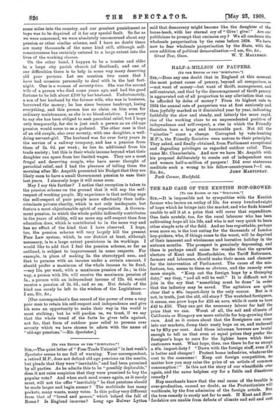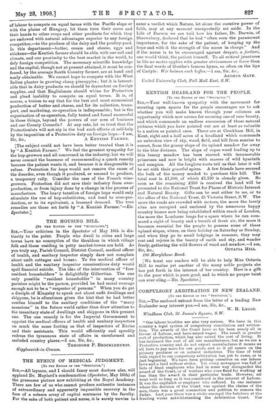THE SAD CASE OF THE KENTISH HOP-GROWER.
(To THE EDITOR 017 THE '' SPECTATOR.")
SIR,—It is impossible not to sympathise with the Kentish farmer who incurs an outlay of 55s. for every hundredweight of hops which he brings into the market, and who finds himself unable to sell it at a price that will cover that expenditure. One feels acutely, too, for the rural labourer who has been cultivating bops all his life, and who is not very quick to learn other simple arts of the field. And no less regrettable, perhaps even more so, is the lost outing for the thousands of London bop-pickers, who, if things come to the worst, will be deprived of their innocent and wholesome and lucrative holiday in the autumn months. The prospect is genuinely depressing, and there is perhaps small cause for wonder that the agrarian electors of Kent and Herefordshire, the Tariff Reformers, farmers and labourers, should make their moan and clamour for the intervention of Parliament. The cause of the mis- fortune, too, seems to them so obvious, and the remedy even more simple. " Keep out the foreign hops by a thumping duty," say they, " and all will be well." It is difficult not to join in the cry that "something must be done" in order that the industry may be saved. The agitators are quite clear that a 40s. import-duty is the only course. But is it not, in truth, just the old, old story ? The wretched foreigners, it seems, can grow hops for £25 an acre, while it costs us here £42 to £50. They can get the necessary labour for half the price that we can. Worst of all, the soil and climate of California or Hungary are more suitable for hop-growing than ours. And so it comes about that the foreigners can come into our markets, dump their nasty hops on us, and undersell us by fifty per cent. And those inhuman brewers are brutal enough to tell us that even at equal prices they prefer the foreigner's hops to ours for the lighter beers which their customers want. What hope, then, can there be for us except a 40s. import-duty ? "Down with the foreign stuff, even if it is better and cheaper ! Protect home industries, whatever the cost to the consumer ! Keep out foreign competition, no matter how you may raise the price of an article of common consumption !" Is this not the story of our wheatfields over again, and the same helpless cry for a futile and disastrous remedy ?
Hop merchants know that the real cause of the trouble is over-production, caused no doubt, as the Protectionists will vociferate, by the free admission of the foreign article. But the true remedy is surely not far to seek. If Kent and Here- fordshire are unable from defects of climate and soil and cost
of labour to compete on equal terms with the Pacific slope or with the plains of Hungary, let them turn their acres and their hands to other crops and other products for which they are endowed with natural advantages superior to any foreign competitor,—to the produce of the dairy and the poultry-yard. In this department—butter, cream and cheese, eggs and chickens—the Kentish farmer should be able, with our soil and climate, and our proximity to the best market in the world, to defy foreign competition. The necessary scientific knowledge and the capital, though not at present attained, it must be con- fessed, by the average South Country farmer, are at band and easily obtainable. We cannot hope to compete with the West Indian planter in growing cheap pineapples ; but it is lament. able that in dairy products we should be dependent on foreign supplies, and that Englishmen should whine for Protection and plead inability to compete on equal terms. It is, of course, a truism to say that for• the best and most economical production of butter and cheese, and for its collection, trans- port, and marketing, co-operation is indispensable ; but is the organisation of co-operation, fully tested and found successful in these things, beyond the powers of our men of business and our• County Councils ? At any rate, let us trust that the Protectionists will not nip in the bud such efforts at self-help by the imposition of a Protective duty on foreign hops.—I am, [The subject could not have been better treated than it is by "A Kentish Farmer." We feel the greatest sympathy for the hop-growers and all concerned in the industry, but we will never commit the baseness of recommending a quack remedy because the patient wants it, and because it is disagreeable to refuse. Protection for• hops would not remove the cause of the disorder, even though it produced, or seemed to produce, a temporary rally. Consider the case of the French wine- growers. Protection did not save their industry from over- production, or• from injury done by a change in the process of manufacture. The heavy taxation of foreign hops would only stimulate the use of hop-substitutes, and tend to over-pro- .ductien, or to its equivalent, a lessened demand. The true remedies are those set forth by " A Kentish Farmer•."—En.
Spectator.]







































 Previous page
Previous page